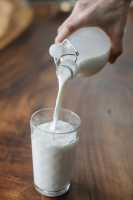Author Interviews, Heart Disease, NEJM, Salt-Sodium, Stroke / 03.09.2021
NEJM Study Finds Salt Substitute Linked to Reduced Risk of Stroke and Heart Attack
MedicalResearch.com Interview with:
Maoyi TIAN PhD
Program Head, Digital Health and Head, Injury & Trauma
Senior Research Fellow
The George Institute
MedicalResearch.com: What is the background for this study?
Response: There is clear evidence from the literature that sodium reduction or potassium supplementation can reduce blood pressure. Reduced blood pressure can also lead to a risk reduction for cardiovascular diseases.
Salt substitute is a reduced sodium added potassium product combined those effects. Previous research of salt substitute focus on the blood pressure outcome. There is no evidence if salt substitute can reduce the risk of cardiovascular diseases or pre-mature death. This study provided a definitive evidence for this unaddressed question.
MedicalResearch.com: What are the main findings?
The main findings of the research were:
- The salt substitute reduced the risk of stroke by 14%
- The salt substitute reduced the risk of major adverse cardiovascular events by 13%
- The salt substitute reduced the risk of pre-mature death by 12%














 The first step that you should take to finding inner peace is to practice yoga and meditation regularly. Yoga and meditation can give you the chance to slow down and reflect, as well as to clear your mind of the worries and negative thoughts that are concerning you. Not only this, but deep breathing is also an important aspect of both yoga and meditation as this can help you to ground yourself and to reconnect with the world around you.
The first step that you should take to finding inner peace is to practice yoga and meditation regularly. Yoga and meditation can give you the chance to slow down and reflect, as well as to clear your mind of the worries and negative thoughts that are concerning you. Not only this, but deep breathing is also an important aspect of both yoga and meditation as this can help you to ground yourself and to reconnect with the world around you.
















